On February 28th the BBC News website published a backgrounder by its Middle East editor Raffi Berg titled ‘Why is Israel-Palestinian violence surging?’ which opens as follows:
“There has been an intensification of violence between Israel and the Palestinians since the start of this year, with deaths mounting on both sides. Here is a brief guide to what is going on.”
Given that, as we have had cause to note on numerous occasions, the BBC has to date generally avoided providing its audiences with information concerning the backdrop to the rise in Palestinian terrorism, the appearance of this backgrounder is worthy of note. But does it do the job?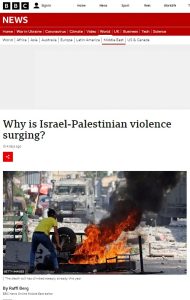
Under the sub-heading ‘What is happening?’ readers find the usual BBC portrayal of relevant history as having begun in June 1967, with no mention of the Jordanian invasion and illegal occupation of the areas concerned 19 years previously and no information given regarding their status as part of the land allocated by the League of Nations for the establishment of a national home for the Jewish people.
“The current violence is mainly taking place in the West Bank and East Jerusalem – areas occupied by Israel since the 1967 Middle East war. While the starting point is debatable, it began to escalate in March 2022. In a period of days, Israel was rocked by a series of deadly Palestinian attacks and the Israeli military launched an open-ended operation in the West Bank in response, resulting in near nightly raids into the occupied territories.”
In contrast to Berg’s portrayal of “the starting point” as March 2022, some experts and analysts point to an earlier date. Jonathan Schanzer and Joe Truzman for example are of the opinion that the starting point came in May 2021 and they explain why:
“By the end of 2021, however, armed clashes between Israeli forces and gunmen had become routine. So it behoves us to look for the turning point. We find it in May 2021 during an 11-day war between Israel and Hamas. Israeli security officials now say that Hamas made a strategic decision after that clash to abandon battles in Gaza because it is a territory the terrorist group already controls. Rather, it elected to export unrest and chaos to the West Bank, with assistance from Iran and some of its proxy groups, with the goal of taking it over. Stoking violence there has the benefit of threatening Israel and destabilizing the rival Palestinian Authority.”
However the word Hamas does not appear even once in Berg’s backgrounder. Readers hence learn nothing about the smuggling of weapons into areas ostensibly under Palestinian Authority control or about Hamas’ practical and financial roles in the establishment, arming and direction of new and existing terror groups.
Instead, under the sub-heading ‘What is driving the violence?’, Berg provides the following tepid and largely unhelpful explanation:
“Each side blames the other, but there are also longer-term underlying causes.
Palestinian attackers and those who support them say they are fighting Israel and the occupation and avenging Israeli assaults. Some of the attacks have been carried out by “lone wolves” – individuals who were not acting on the orders of an organisation. Israel accuses the Palestinian Authority (PA) – the Palestinians’ governing body in the West Bank – of inciting such attacks.
Other attacks have been carried out by Palestinian militant groups, including the newly formed Lions’ Den, whose popularity on the Palestinian street has surged.
Israel says its ongoing operation in the West Bank, called “Break the Wave”, is targeting militant groups with arrest raids to stop them from launching attacks. The raids, however, are often taking place in densely populated refugee camps and other urban areas, where they meet resistance from gunmen and often turn bloody.”
Berg fails to clarify to his readers that the reason counter-terrorism operations take place “in densely populated refugee camps and other urban areas” is because that is where the terrorists have set up shop and where they try to hide.
As we see, Berg avoids additional relevant topics such as the Palestinian Authority’s loss of control in some areas, its failure to meet its Oslo Accords obligations to combat terrorism, internal political turmoil and the growing involvement of members of the PA security forces in terrorism and armed attacks. The best he can do on those issues comes in one sentence in the final section of his backgrounder in which readers are told that:
“The PA – derided and seen as complicit in Israel’s military occupation by many Palestinians – shows no appetite to act against militants, a move which would be unpopular among ordinary Palestinians and put its own survival at risk.”
In that same final section Berg tells readers that:
“Israel’s new hard-line, right-wing government is also intensifying measures against Palestinian violence, including accelerating demolitions of attackers’ homes, allowing for attackers to be deported, and expanding Jewish settlements in the West Bank.” [emphasis added]
The proposed amendment to the Citizenship law which would allow the negation of Israeli citizenship of terrorists who received financial rewards from the Palestinian Authority has not yet made its way through the parliamentary process. Contrary to the impression given by Berg, any ‘expansion’ of communities in Judea & Samaria has also yet to take place. He goes on to assert that “Jewish settlements” are a “root cause” of a conflict which long precedes the establishment of any such communities:
“The ongoing expansion of Jewish settlements on land Palestinians claim for a future state is seen by them as a root cause of their long conflict with Israel. Settlements are considered illegal under international law, though Israel disputes this.”
The second section of Berg’s article is sub-headed ‘How has it got worse?’ and there readers find the following:
“Last year, at least 146 Palestinians – militants, civilians and attackers – were killed by Israeli forces in the West Bank and East Jerusalem – more than any time since UN records began in 2005. Meanwhile, 29 Israelis and two foreign nationals – all but four of whom were civilians – were killed in attacks by Palestinians or Israeli Arabs. This was deadliest year for Israelis since 2015.”
Interestingly, while Berg provides BBC audiences with the exact ratio of civilians to security personnel on the Israeli side, he avoids doing the same on the Palestinian side, instead making do with a general portrayal of “militants [i.e. terrorists], civilians and attackers” and a link to unhelpful material put out by UNOCHA, thus leaving readers to speculate how many of the 146 belonged to which of those three categories.
Seeing as the information is available in the public domain, there is no reason why the BBC should not be able to inform its audiences that the majority of the Palestinians killed in 2022 were not uninvolved civilians but terrorists and/or males carrying out attacks or engaged in violence. The same approach is seen in the next paragraph:
“Already in the first two months of this year, the death toll – 60 Palestinians and 14 on the Israeli side – has been higher than any similar period in 2022, swelled by some of the bloodiest incidents in years.”
He goes on to state:
“In one Israeli military raid in Nablus in February, 11 Palestinians were killed in the ensuing violence, with dozens more injured by bullets, according to the Palestinian health ministry. In another raid and gun-battle in Jenin the previous month,10 Palestinians were killed.”
Berg does not clarify that over half of the people killed in Nablus on February 22nd belonged to terrorist groups or engaged in violence at the time, as did all but one of the fatalities in Jenin on January 26th.
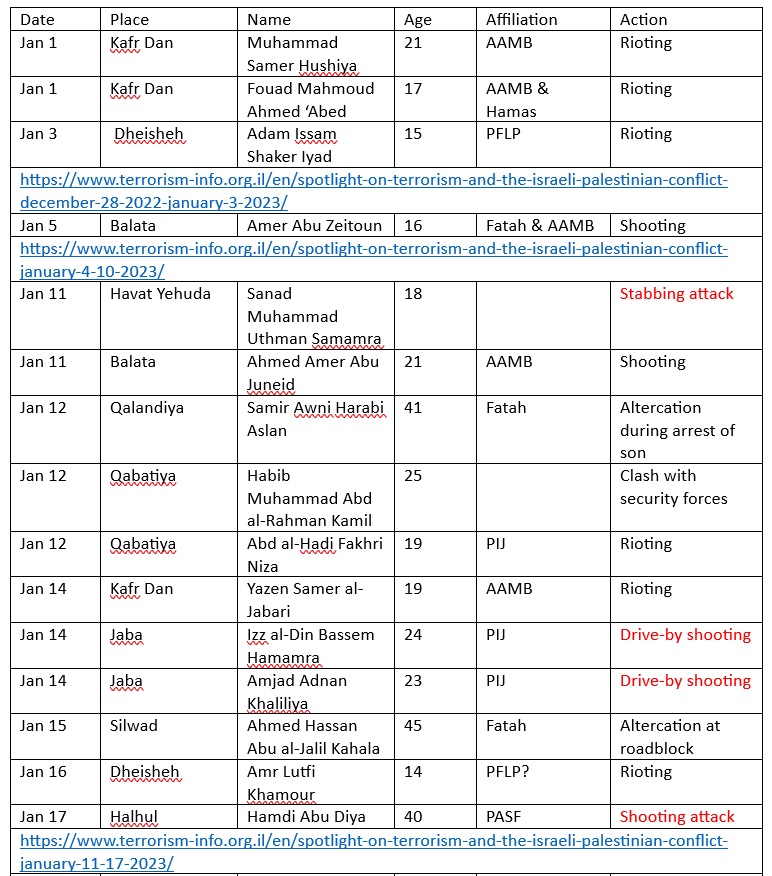

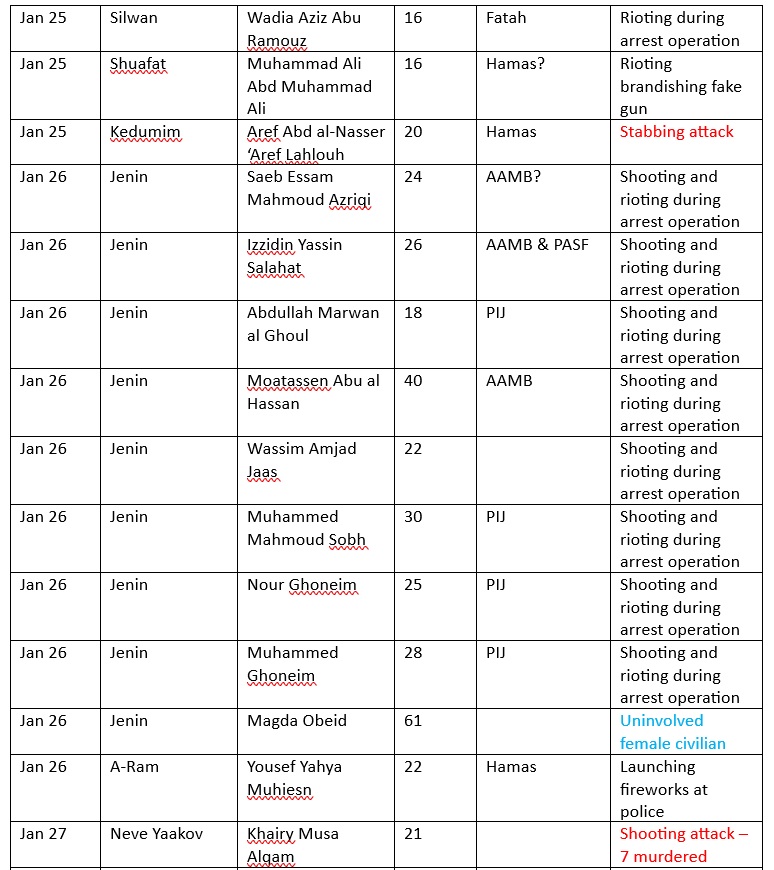

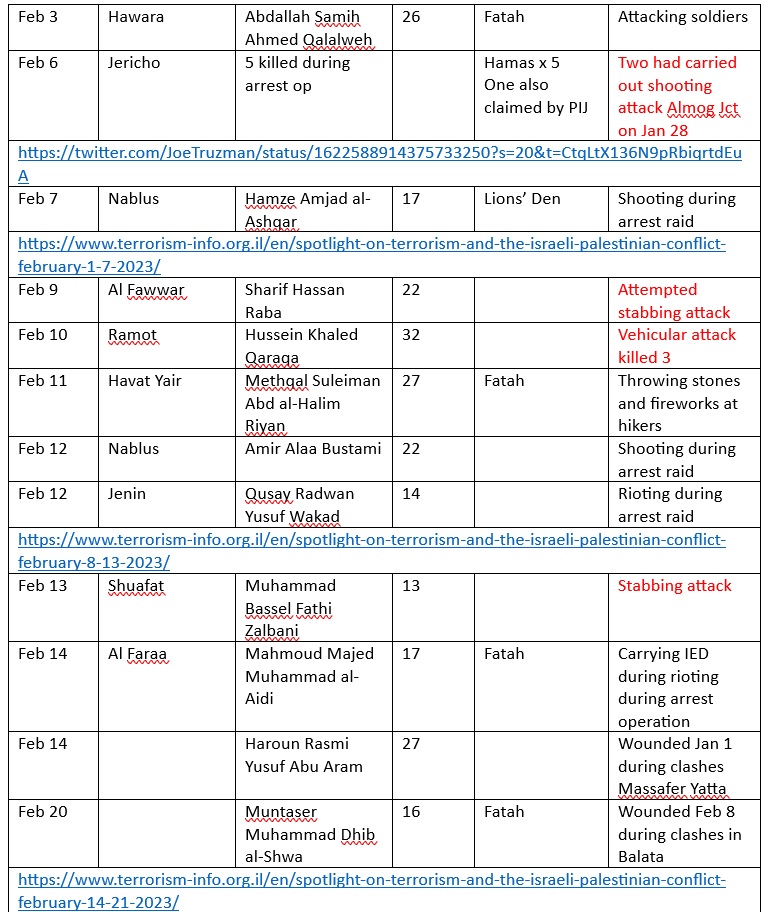
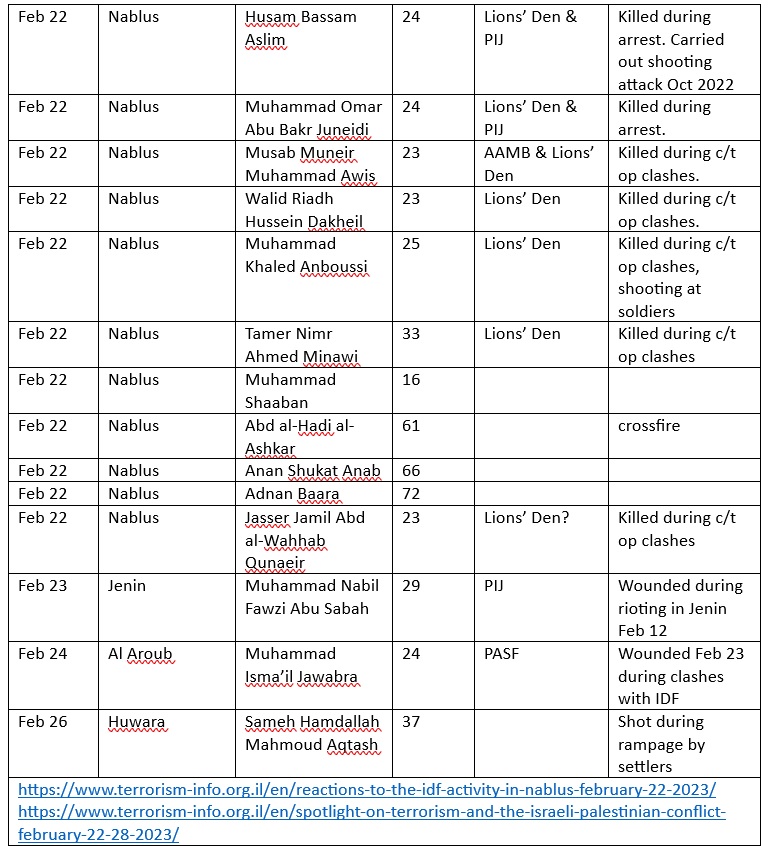
In summary, this BBC backgrounder continues to promote the BBC’s existing editorial stance of promoting false equivalence between Palestinian terrorism and Israeli counter-terrorism operations while avoiding informing readers that the overwhelming majority of Palestinian fatalities were terrorists or males engaged in violence at the time.
Together with its avoidance of the backdrop and context to the rise in terrorism over the past 22 months, that makes this backgrounder a pretty pointless exercise.
Related Articles:
BBC NEWS STILL AVOIDING THE ISSUE OF LACK OF PA GOVERNANCE
BBC REPORTING ON A COUNTER-TERRORISM OPERATION IN NABLUS

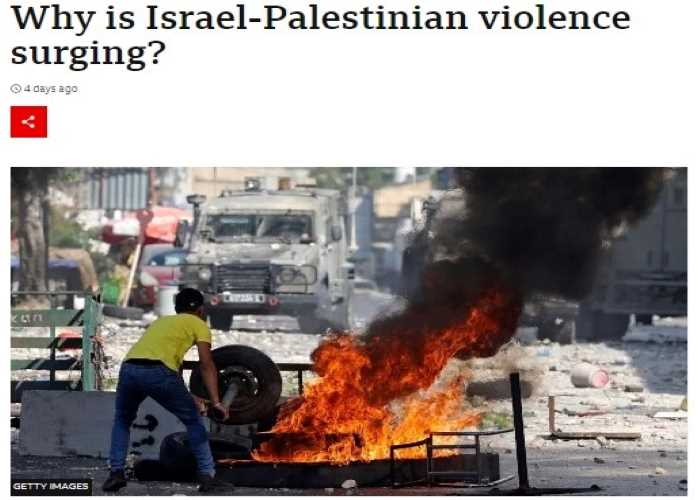
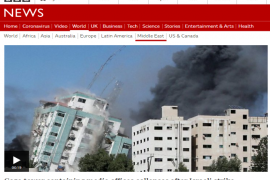
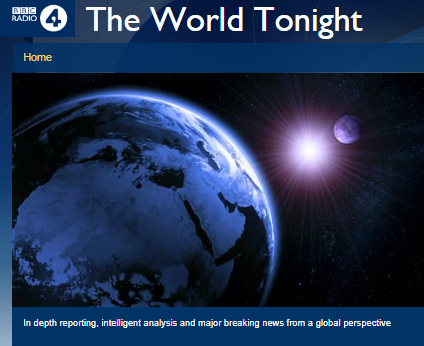

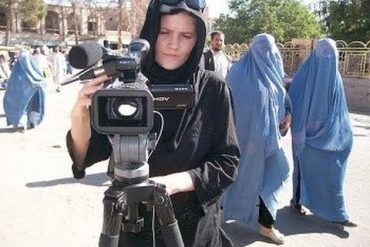
Anyone with a modicum of intelligence should be able to see that terrorist attacks come from Palestinians and counter terrorist raids come from Israelis. So if the Palestinians would stop attacking Israeli civilians there would be no need for Israeli counter terrorism raids. #simples #defundthebbc
It would appear BBC is in the pay of Arabs when the starting point is not the LEGAL basis for the Jewish State proclaimed by the Supreme Council of the Allied Powers (Great Britain, France, Italy, Japan and the U.S. acting as an observer) at San Remo in April 1920.
See https://www.jstor.org/stable/resrep26340